ARRESTS.ORG MA – SEARCH MASSACHUSETTS ARREST RECORDS
In the pursuit of information and clarity, delve into the comprehensive realm of Massachusetts arrest records with ARRESTS.ORG MA. This dedicated platform offers an invaluable resource for individuals seeking to navigate the intricacies of the state’s arrest data. Discover a user-friendly interface that empowers you to efficiently search and access Massachusetts arrest records with ease. ARRESTS.ORG MA ensures that the process is straightforward, providing transparency and insights into the legal landscape surrounding these records.
SEARCH MASSACHUSETTS ARREST RECORDS
Navigate the wealth of information seamlessly at ARRESTS.ORG MA, where our commitment to providing accurate and up-to-date data sets us apart. Uncover details about arrests, legal proceedings, and related information, all consolidated in one user-friendly hub. ARRESTS.ORG MA becomes your go-to source for accessing Massachusetts arrest records, delivering a reliable and transparent experience to keep you well-informed and aware.
Click here to check this:https://massachusetts.recordspage.org/arrest-criminal-records/
Understanding the Massachusetts Criminal Court System
The Massachusetts state judiciary is structured with the Supreme Judicial Court at the apex, followed by the Appeals Court and seven trial court departments. These trial courts include the Superior Court, District Court, Land Court, Housing Court, Juvenile Court, Probate and Family Court, and Boston Municipal Court. Felony and misdemeanor cases are generally initiated in the district or superior court, while first-degree murder cases fall under the exclusive jurisdiction of the Superior Court. Appeals can be made to the Appeals Court, and final appeals go to the Supreme Judicial Court. Federal crimes in the state fall under the jurisdiction of the United States District Court for the District of Massachusetts.
Differences Between Criminal Records and Arrest Records Searches in Massachusetts
In Massachusetts, conducting both criminal records searches and arrest records searches serves distinct purposes, offering valuable insights into an individual’s legal history. Criminal records searches typically provide comprehensive information about a person’s criminal history, encompassing details on convictions, sentences, and court proceedings. This broader scope allows individuals or entities to gain a more comprehensive understanding of an individual’s legal background.
On the other hand, arrest records searches specifically focus on the instances when an individual was taken into custody by law enforcement. While arrest records do not necessarily indicate guilt, they do provide details about the circumstances surrounding an arrest, charges filed, and the legal process initiated. Understanding the differences between these two types of searches enables individuals, employers, or organizations in Massachusetts to tailor their inquiries based on specific information needs, whether for employment screenings, tenant evaluations, or other purposes requiring insight into an individual’s legal history. For a broader search across states, access arrest records at Arrests.org to stay informed on law enforcement activities nationwide.
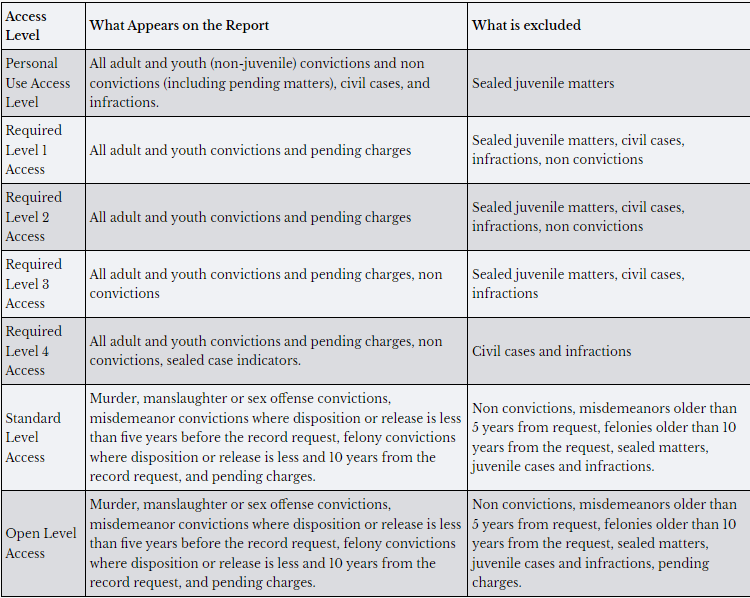
What’s Included in Massachusetts Criminal Court Records
Massachusetts Criminal Court Records serve as comprehensive repositories of vital information pertaining to legal proceedings within the state’s jurisdiction. These documents encompass a wealth of crucial details essential for understanding the intricacies of criminal cases. Among the fundamental components included in these records are the personal particulars of the accused individuals. This encompasses their full name, relevant demographic information, and any other pertinent identifiers.
One of the central elements encapsulated in these records is the precise nature of the charges brought against the accused. This information sheds light on the legal aspects of the case, outlining the offenses or allegations that have prompted legal action. The inclusion of the case file number serves as a unique identifier, facilitating streamlined access and reference to the specific legal proceedings in question.
Furthermore, Massachusetts criminal court records furnish a meticulous chronicle of the legal journey undertaken by the accused. This narrative begins with the preliminary hearing, where initial legal actions are taken, and extends through the sentencing phase, providing insight into the penalties imposed upon conviction. Should the accused opt for a plea bargain rather than proceeding to a trial, the records duly reflect these negotiated agreements, shedding light on mutually agreed-upon consequences, which may include jail time, fines, or probationary terms.
Obtaining Massachusetts Criminal Court Records
Securing access to Massachusetts criminal court records is a meticulous process, reflecting the state’s commitment to transparency in legal proceedings. These records, containing crucial details of criminal court cases, are generally accessible to the public, provided the information is not confidential, and the requester meets specific eligibility requirements. One avenue for obtaining these records involves in-person requests, where individuals navigate the decentralized structure of district and superior courts to reach the custodian of records, typically the clerk of courts. In-person requests require careful preparation, including collecting necessary case details and may involve nominal fees, ensuring a comprehensive and direct interaction with the court system.
Alternatively, individuals can pursue mail-in queries, following similar procedures with a written request, necessary case information, and payment for search and copy fees enclosed. Online resources, such as the Mass.gov website, offer electronic access to court records, providing a convenient option for those seeking information that can be viewed without special permissions. The state’s commitment to transparency extends to the online realm, where the Massachusetts Trial Court Dockets, Supreme Judicial Court and Appeal Court Dockets, and the Attorney Portal serve as centralized repositories for state-wide criminal court records. While these resources enhance accessibility, it’s essential to recognize the limitations, with full court case information often requiring in-person requests for a more comprehensive understanding of legal proceedings. In essence, the process of obtaining Massachusetts criminal court records is intricately designed to accommodate varied preferences while upholding the principles of openness and accountability in the state’s judicial system.
Contacting an Inmate in Massachusetts Jail and the Steps to Post Bail
To communicate with an inmate in a Massachusetts jail and initiate the bail process, certain steps must be followed. Firstly, individuals can contact the correctional facility where the inmate is held to obtain relevant information about visitation schedules, approved communication methods, and any specific procedures in place. Additionally, it’s essential to gather details about the inmate’s full name and identification number to streamline the communication process.
When it comes to posting bail in Massachusetts, the process involves several steps. Generally, the individual seeking to post bail must contact the appropriate court and inquire about the bail amount set for the specific case. Subsequently, they can choose to pay the bail directly to the court or enlist the services of a bail bondsman, who typically charges a non-refundable fee but covers the majority of the bail amount. Understanding these steps is crucial for those seeking to aid an inmate in securing release from jail in Massachusetts.
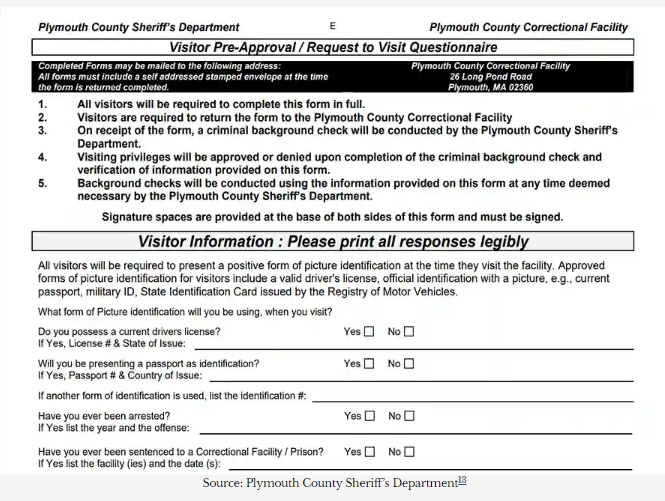
How to Access Massachusetts Criminal Court Records In Person
Accessing Massachusetts criminal court records in person involves a step-by-step process designed to ensure accuracy and adherence to legal protocols. The initial task is to identify the record custodian, often the clerk of courts in the jurisdiction where the case was heard. Armed with essential information such as the full names of the plaintiff and/or defendant, the names of their respective attorneys, the case file number, and the date of the original charge, individuals are better equipped to navigate the court’s decentralized structure.
Upon locating the record custodian, individuals can make in-person requests, either by scheduling an appointment or directly visiting the office. The process may include completing a request form, where personal information and details of the specific record of interest are provided. In some cases, individuals may be allowed to self-serve using public terminals, particularly if the document requested is a matter of public record. Alongside this, individuals may need to present identification and fulfill nominal fees, ensuring a comprehensive and transparent process for obtaining Massachusetts criminal court records in person.
Locate Criminal Records in Massachusetts Through County Court Record Searches
If you aim to access criminal records in Massachusetts, a practical approach involves conducting searches within county court records. Massachusetts, like many states, maintains comprehensive records at the county level, which can provide detailed insights into an individual’s criminal history. To initiate this process, you may need to identify the specific county where the person in question has a legal history. Once the county is determined, individuals can reach out to the respective county courthouse or utilize online databases, if available, to search for criminal records related to arrests, convictions, and court proceedings. This targeted county-based approach facilitates a more efficient and focused search for relevant criminal information.
By navigating county court records, individuals, employers, or organizations can access a wealth of information, including charges filed, case dispositions, and sentencing details. This method ensures a thorough examination of an individual’s criminal background within the jurisdiction where legal proceedings took place, offering a more localized and in-depth perspective on their legal history in Massachusetts.
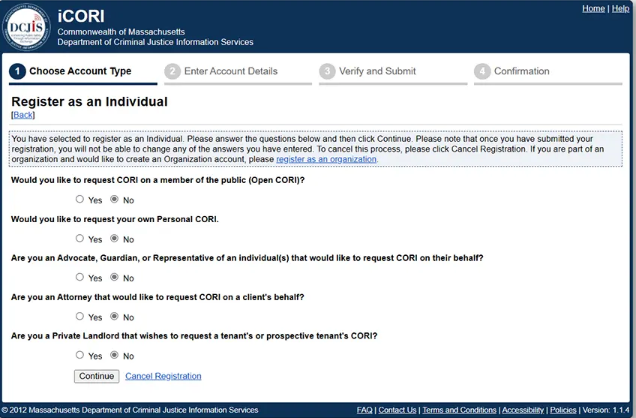
How to Find Massachusetts Criminal Court Records by Mail
Seeking Massachusetts criminal court records by mail is a methodical process requiring individuals to initiate a written request detailing the specific document required and pertinent case information. This written request should typically include the full names of the offender and complainant, the case file number, and the date and place of the case filing. Additionally, jurisdictions often specify the inclusion of a nominal fee to cover search and copy costs, along with a copy of a government-issued photo ID to authenticate the requester’s identity.
To streamline the mail-in request process, some court record custodians provide official record request forms, offering a standardized format for gathering necessary information. Enclosing the request form, along with the essential payment and identification, in a self-addressed envelope contributes to an efficient and organized means of obtaining Massachusetts criminal court records through the mail.
Obtaining Copies of Criminal Records in Massachusetts and Statewide Arrest Records
Securing copies of criminal records in Massachusetts and accessing statewide arrest records involves a straightforward yet detailed process. To obtain criminal records in Massachusetts, individuals typically need to contact the Criminal History Systems Board (CHSB) or the specific law enforcement agency responsible for maintaining such records. Requesting records may involve completing an application, providing identification, and possibly paying a fee. The process for obtaining statewide arrest records often begins by reaching out to the Massachusetts State Police or the Department of Criminal Justice Information Services (DCJIS), which oversees the state’s Criminal Offender Record Information (CORI) system.
In both cases, it’s essential to follow the designated procedures, ensuring compliance with privacy laws and regulations. Some information may be accessible to the public, while certain details may be restricted based on the nature of the request and the individual’s relationship to the subject of the records. Familiarizing oneself with the specific requirements for obtaining these records streamlines the process and allows for a comprehensive understanding of an individual’s criminal history at both the state and local levels in Massachusetts.
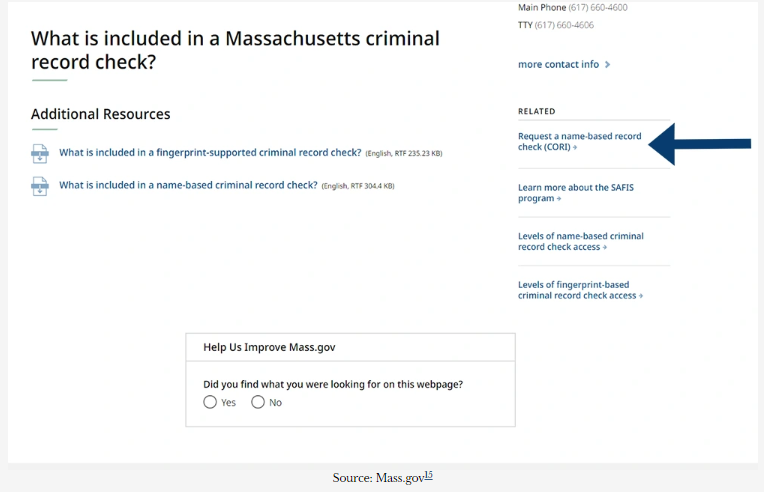
How to Find Massachusetts Criminal Court Records Online
Accessing Massachusetts criminal court records online is facilitated through several state-provided resources. The MA Trial Court Dockets, Supreme Judicial Court and Appeal Court Dockets, and the Attorney Portal are key tools for electronic access to criminal court records. These resources allow users to search for case information using parameters such as the names of parties involved, case numbers, and docket numbers. This search yields basic case details and docket entries, offering a convenient and centralized method for obtaining electronic information on criminal court proceedings.
Moreover, the Attorney Portal, available on the official Massachusetts court website, caters to legal professionals seeking to track their cases. Users are required to obtain login information by providing their email address before utilizing the portal. Additionally, while not government-sponsored, some third-party websites may also serve as a starting point for researching publicly available records. These websites typically provide search engines where users can input the names of involved parties and the assumed location of the records. It’s important to note that the availability of records on third-party sites may vary from official channels.
Determining if Someone in Massachusetts Is Currently on Probation or Parole?
Discovering whether an individual is currently on probation or parole in Massachusetts involves navigating specific channels within the state’s criminal justice system. To obtain this information, individuals can contact the Massachusetts Probation Service, which oversees probation matters in the state. In some cases, accessing such details may require submitting a formal request or inquiry to the appropriate office, providing relevant information about the person in question. Additionally, the Massachusetts Department of Correction can provide information on parole status, as it oversees parole matters within the state. A careful and respectful approach is necessary, as accessing probation or parole status may be subject to legal and privacy constraints.
Understanding the protocols and agencies involved is crucial for those seeking to determine an individual’s probation or parole status in Massachusetts. By adhering to the established procedures and respecting privacy considerations, individuals can gain valuable insights into an individual’s current legal status within the state’s criminal justice system.
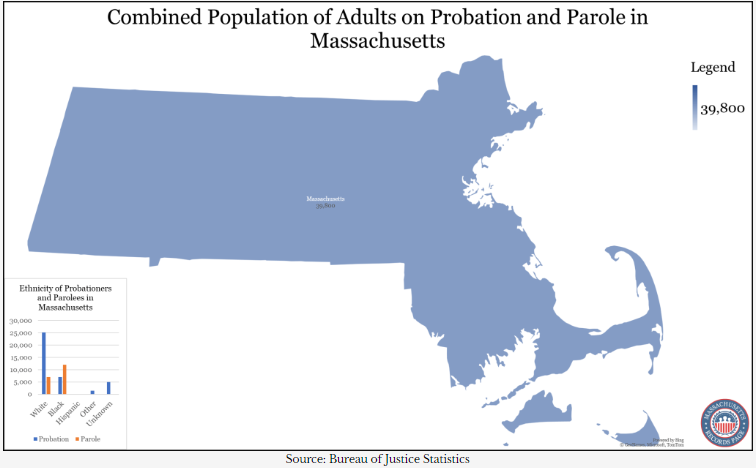
Are all Massachusetts Criminal Court Records Public?
In Massachusetts, the majority of criminal court records are considered public, aligning with the state’s public record laws. This means that the general public has the right to inspect and obtain copies of these records, encompassing docket information, court actions, motions, and filed evidence. These accessible records provide a comprehensive overview of the proceedings, ensuring transparency and accountability within the legal system.
However, it’s important to note that the right to access Massachusetts criminal court records is not absolute. Certain records, often those containing confidential information or sealed by court order, are subject to restrictions. This includes records pertaining to adoption, assault cases, grand jury proceedings, and other instances where court orders or subpoenas may impose limitations on public access. The Supreme Judicial Court’s guidelines outline specific categories of records that are either accessible to the public, closed, or subject to discretionary access by the court.
How to Find Massachusetts Public Records for Free
Accessing Massachusetts public records for free can be facilitated through the online resources offered by the state government. These resources allow individuals to obtain basic court case information at no cost, including the names of involved parties, their addresses, docket entries detailing court actions, and other pertinent details. The state’s commitment to transparency is reflected in the availability of this information to the public, ensuring an informed citizenry.
It’s important to note that while these online resources provide valuable insights, the scope of accessible information may be limited when compared to in-person requests. Full court case details, particularly those involving sensitive information or certain categories of records, may necessitate a visit to the relevant courthouse. This dual approach aims to balance public access with the protection of sensitive information, maintaining a delicate equilibrium between transparency and privacy in the dissemination of public records.
Guidelines for Sealing or Expunging a Criminal Record in Massachusetts
In Massachusetts, the process of sealing or expunging a criminal record is governed by specific guidelines and procedures. Sealing a criminal record means that the information is not available to the general public, while expunging involves the complete erasure of the record. To begin this process, individuals must first determine their eligibility, as not all offenses can be sealed or expunged. Generally, certain non-violent misdemeanors and felonies may be eligible for sealing after a specified waiting period, while more serious offenses might not qualify.
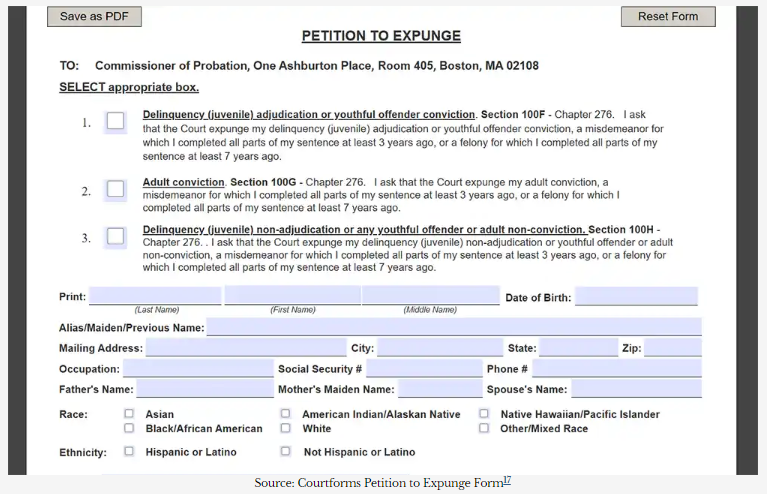
To initiate the sealing or expungement process, individuals should contact the court where the criminal case was handled. They may need to file a petition, provide supporting documentation, and pay any required fees. It’s crucial to follow the court’s guidelines carefully and, in some cases, attend a hearing. Seeking legal advice or assistance from an attorney experienced in Massachusetts expungement laws can be beneficial to navigate the complexities of the process successfully.
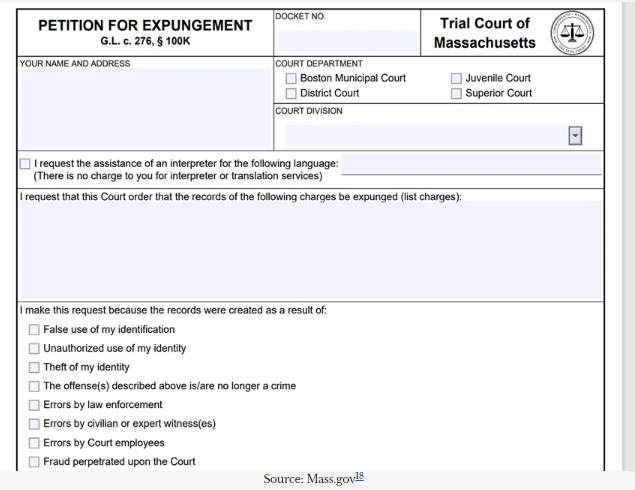
Understanding the nuances of sealing or expunging a criminal record in Massachusetts empowers individuals to take steps toward a fresh start, ensuring that past legal issues do not unnecessarily hinder future opportunities. The process requires diligence and adherence to legal requirements, but the potential benefits in terms of improved employment prospects and reduced stigma are often worth the effort.
Accessing Sealed Massachusetts Criminal Court Records
Gaining access to sealed Massachusetts criminal court records involves a specific process designed to protect sensitive information. Eligibility is typically limited to individuals with legal authorization, such as law enforcement personnel, staff from the Department of Health and Human Services, or licensed agents. In some cases, eligible individuals may be required to obtain a court order to access sealed records, ensuring that privacy and confidentiality are maintained while still providing access to those with a legitimate need.
Massachusetts statutes automatically seal certain types of records to safeguard individuals’ privacy. These include records containing personal information about juveniles, details related to grand jury proceedings, and information pertaining to adoption cases. The automatic sealing of these records underscores the state’s commitment to balancing transparency with the protection of individuals involved in sensitive legal matters.
Finding Individuals in Federal and Massachusetts State Prisons
Finding individuals in federal and Massachusetts state prisons requires navigating through official channels and databases. For federal prisons, the Bureau of Prisons (BOP) website provides an inmate locator tool that allows users to search for individuals in federal custody by their name or registration number. Additionally, contacting the BOP directly or checking court records may provide information on an individual’s federal incarceration status. In Massachusetts, the Department of Correction (DOC) website offers an inmate locator tool for state prisons. Users can search for individuals by their first and last names or their offender identification number. Alternatively, contacting the Massachusetts DOC or checking court records can help in locating individuals within the state prison system. It’s important to note that accessing such information is subject to privacy laws and may require proper authorization or legal justification.
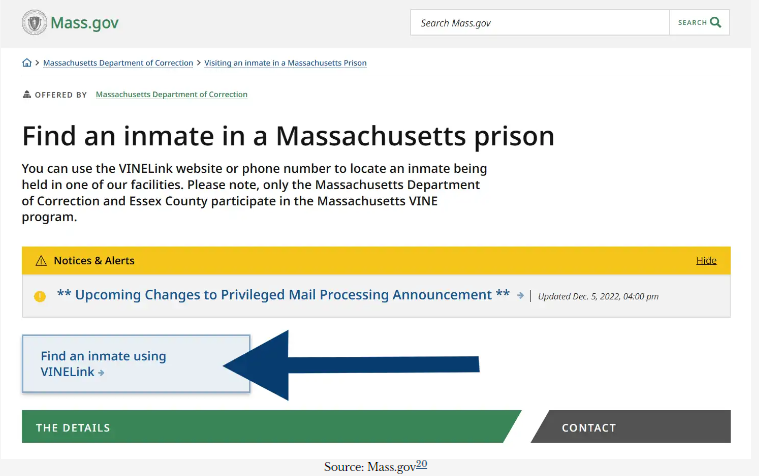
Guide to Accessing Massachusetts Criminal and Arrest Records
Navigating the landscape of Massachusetts criminal and arrest records involves understanding the parameters set by the Freedom of Information Act (FOIA) and the state’s regulations. In Massachusetts, these records are generally considered part of the public domain, allowing individuals to access valuable information. However, it’s crucial to be aware of any exceptions or restrictions outlined by the General Court of the Commonwealth of Massachusetts, as certain records may be subject to privacy protections or legal limitations on disclosure. To ensure a comprehensive understanding, individuals seeking this information should familiarize themselves with the relevant legal framework and the various channels available for accessing such records.
To initiate the process, individuals can explore online resources provided by the state, including court dockets and official portals. These platforms offer a user-friendly interface to search for criminal and arrest records based on specific parameters such as names, case numbers, or dates. Additionally, understanding the procedures for accessing records in person or through mail-in requests is crucial, ensuring that individuals can obtain the information they need while adhering to legal requirements and privacy considerations.
What Records are Public?
Massachusetts criminal records are generally considered public records under General Laws, Part One, Title X, Chapters 66 and 66A. This means that, in accordance with the state’s public records laws, members of the public have the right to access these records. However, it’s crucial to note that certain exceptions exist to protect sensitive information and maintain privacy. Examples of restricted information include juvenile records, details about victims, sealed or expunged records, and specific law enforcement investigative reports. These restrictions are in place to balance the public’s right to access information with the need to safeguard individuals’ privacy and uphold legal considerations.
Understanding these exceptions is essential for individuals seeking access to Massachusetts criminal records, as it ensures a responsible and lawful approach to obtaining information while respecting privacy rights and legal constraints. Familiarity with the specific statutes governing access to these records provides clarity on what information is publicly available and what aspects may be subject to restrictions or limitations.
Freedom of Information Act (FOIA) and Federal Access
The Freedom of Information Act (FOIA) is a crucial federal law that enhances transparency and accountability by granting the public access to certain federal records. In the context of Massachusetts, FOIA facilitates access to federal records generated within the state. This includes a range of information, such as bankruptcy records, federal criminal convictions, and details regarding federal prison incarcerations. FOIA acts as a powerful tool for citizens, journalists, and researchers to obtain information about federal activities and decisions.
It’s important to note that while FOIA primarily applies to federal records, each state also has its own set of public records laws, like the Massachusetts Public Records Law, governing access to state and local government records. Understanding the interplay between federal and state laws is essential for those seeking comprehensive information, ensuring that they navigate the legal landscape effectively and access the records they need.
Understanding Criminal Records vs Arrest Records
Distinguishing between criminal records and arrest records is vital for a comprehensive understanding of an individual’s legal history. Arrest records offer insights into the circumstances of an arrest, detailing when and where it occurred, along with the charges brought against the individual. These records are often created at the time of arrest and provide a snapshot of law enforcement involvement.
Criminal records, however, present a more detailed perspective. In Massachusetts, criminal records go beyond the initial arrest information and encompass the entire legal process, offering disposition details on the charges filed against the individual. This broader view includes information about court proceedings, judgments, and any penalties or sentences imposed, providing a comprehensive overview of an individual’s involvement with the criminal justice system. Understanding these distinctions is essential for anyone seeking thorough insights into an individual’s legal background.
Access Levels in Massachusetts Criminal Records
Massachusetts criminal records are categorized into six distinct access levels, each offering varying degrees of information disclosure. The access levels are designed to cater to different purposes, ensuring that individuals or entities receive the appropriate level of detail based on their needs.
At the most restricted end of the spectrum is Personal Use Access, which provides limited information suitable for personal use only. On the other hand, Open Level Access allows for comprehensive access, offering a detailed view of an individual’s criminal history. Understanding these access levels is crucial for users to make informed decisions about the type and depth of information they require. Whether conducting personal background checks or professional investigations, navigating these access levels ensures that the right information is accessed for the intended purpose.
Verifying the Massachusetts Sex Offender Registry for Proximity to Your Location
To ensure awareness and safety, checking Massachusetts’ Sex Offender Registry for nearby predators involves a straightforward process. The Massachusetts Sex Offender Registry Board (SORB) provides an online tool that enables individuals to search for registered sex offenders based on location. By visiting the SORB website and entering specific criteria such as address, city, or ZIP code, users can access a list of registered sex offenders in proximity to their chosen location. The online registry typically includes information about the offender’s photograph, address, conviction details, and any relevant restrictions imposed by the court.
Regularly checking the Massachusetts Sex Offender Registry is a proactive step towards maintaining personal and community safety. By utilizing this online resource, individuals can stay informed about the presence of registered sex offenders in their vicinity and take necessary precautions. Additionally, the website offers guidance on safety tips and resources, providing a comprehensive approach to enhancing awareness and ensuring a secure environment.
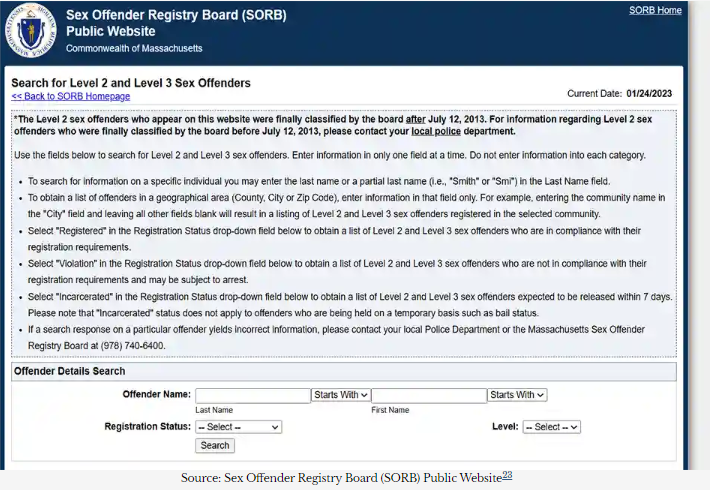
Finding Individuals in Federal and Massachusetts State Prisons
Locating someone in federal prison or a state prison in Massachusetts involves following specific procedures to navigate the respective correctional systems. To find an individual in a federal prison, the first step is to visit the Federal Bureau of Prisons (BOP) website, which provides an online inmate locator tool. By entering the person’s details, such as their name or inmate number, individuals can obtain information on their current location and other relevant details. For state prisons in Massachusetts, the Massachusetts Department of Correction (DOC) offers a similar online inmate search tool. Utilizing this resource allows individuals to access information about an inmate’s incarceration, sentence duration, and the facility where they are held.
It’s important to note that while online tools provide a convenient way to locate individuals in federal or state prisons, contacting the respective correctional facilities directly is another avenue. Contact information for federal prisons can be obtained through the BOP website, while the Massachusetts DOC website provides details for state correctional facilities. Communicating with the prison staff can offer additional insights and help address specific inquiries regarding an individual’s status, visitation guidelines, or any other relevant information.
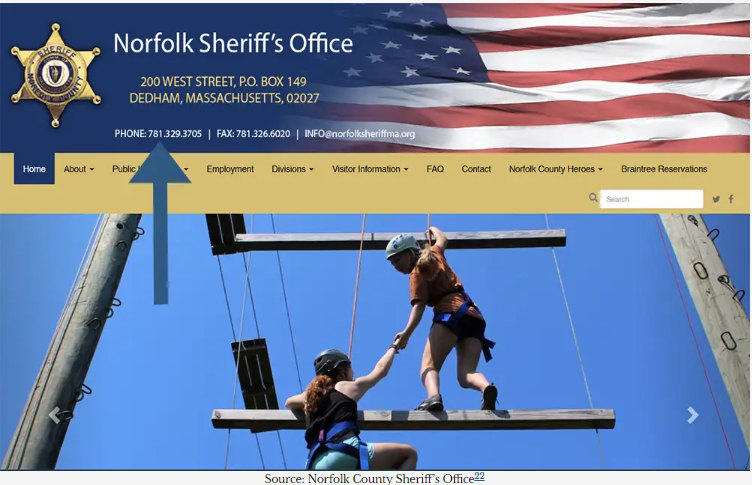
Fingerprint-Based Searches
In Massachusetts, individuals and organizations seeking more comprehensive criminal background checks can opt for fingerprint-based searches conducted through the Statewide Applicant Fingerprint Identification Services (SAFIS). These searches offer a heightened level of accuracy and detail, providing reports from different departments to ensure a thorough examination of an individual’s criminal history.
The four types of fingerprint-based searches available through SAFIS cover distinct aspects, such as criminal history information from the Massachusetts Department of Criminal Justice Information Services (DCJIS), sex offender registry checks, firearms licensing background checks, and Department of Children and Families (DCF) background checks. Leveraging fingerprint-based searches adds an extra layer of reliability to the screening process, making it a valuable option for those who require in-depth and precise information for employment, licensing, or other critical decision-making processes.
Finding Recent Arrests in Massachusetts
If you’re interested in recent arrests or want to know who is currently incarcerated, follow these steps:
Online Search: Use a search engine and type Massachusetts jail inmate search.
Official County Jail Website: Look for the official county jail website, usually operated by the local sheriff’s office.
Inmate Information: Search for inmate information on the website, or call the sheriff’s office if no online directory is available.
County Arrest Records Search in MA
County jails, maintained by sheriff’s offices, are the primary source of housing arrestees in Massachusetts. Here is a list of county sheriff’s offices, each providing information on jail inmates:
Barnstable County Sheriff’s Office
Berkshire County Sheriff’s Office
Bristol County Sheriff’s Office
Dukes County Sheriff’s Office
Essex County Sheriff’s Office
Franklin County Sheriff’s Office
Hampden County Sheriff’s Office
Hampshire County Sheriff’s Office
Middlesex County Sheriff’s Office
Norfolk County Sheriff’s Office
Plymouth County Sheriff’s Office
Suffolk County Sheriff’s Office
Worcester County Sheriff’s Office
Contacting an Inmate in Jail & Posting Bail
Knowing where someone is in jail is the first step in making contact or posting bail. Follow these steps:
Search Engine Inquiry: Type “[county name] Massachusetts jail contact an inmate.”
Official County Jail Website: Find the official county jail website and review information on contact, visitation, and telephone calls.
Follow Procedures: Each jail has its own policies, so ensure you understand the visitation and contact procedures before attempting to visit or call.
Finding Criminal Records in Massachusetts County Courts
To conduct a thorough investigation into criminal records in Massachusetts, consider visiting county courts where pertinent information may be accessed through public terminals. Within each county clerk’s office, a wealth of court records is maintained, and individuals can utilize public terminals to search for specific cases. By entering the first and last name of the person of interest, you can efficiently retrieve relevant criminal records, providing a detailed overview of legal proceedings and outcomes
This method offers an on-site approach for individuals seeking in-depth information, ensuring a comprehensive examination of criminal records directly at the source. It is particularly beneficial for those who prefer or require a hands-on approach to accessing and reviewing criminal records within the county court system in Massachusetts.
Obtaining Criminal Records in Massachusetts
To obtain a complete criminal history in Massachusetts, follow these steps:
Visit iCORI: Go to the Department of Criminal Justice Information Services’ iCORI system.
Register or Log In: Create an account or log in if you already have one.
Record Request: Add a record request to the shopping cart and complete the payment process with a $25 record fee.
Checking Probation or Parole Status
When it comes to checking probation or parole status in Massachusetts, it’s important to note that this information is not readily accessible to the public without the written consent of the individual involved. The state maintains a strict policy on the confidentiality of probation and parole details. However, individuals can gain insights into case dispositions through the Criminal Offender Record Information (CORI) system. CORI records offer valuable information related to case outcomes, allowing interested parties to understand the resolution of legal matters without compromising the privacy of probation or parole details.
By relying on CORI records, individuals can obtain a comprehensive overview of case dispositions, enabling them to stay informed about the legal outcomes without delving into the specific probation or parole status, which remains protected under privacy regulations in Massachusetts.
Sealing or Expunging a Criminal Record in Massachusetts
When records are sealed or expunged, they are shielded from public view. Follow these steps:
Official Massachusetts Expungement Website: Visit the official Massachusetts government website for expungements.
Check Eligibility: Find out if you are eligible by reviewing the expungement criteria.
Complete Petition: If eligible, complete the petition to expunge the record and submit it to the specified address.
Locating Someone in Federal and State Prisons in Massachusetts
For locating inmates in Massachusetts prisons, use the state-approved third-party vendor, VINELink.
Follow these steps:
Visit Massachusetts Government Website: Navigate to the Massachusetts government website.
Access VINELink: Click on “Online” to find the link for VINELink.
Search for Inmates: Choose Massachusetts from the drop-down menu, select a name-based search, enter the person’s details, and submit the search.
Checking for Arrest Warrants in Massachusetts
Warrants in Massachusetts may not always be readily available to the public. To check for active warrants:
Search Engine Inquiry: Type “[county name] county Massachusetts warrant search.”
Law Enforcement Website: Visit the first official law enforcement website for the county and look for a warrant list or most wanted list.
Contact Law Enforcement: If no online information is available, call the listed phone number to inquire about active warrants.
Massachusetts Sex Offender Registry
To search the Massachusetts sex offender registry:
Visit the Registry Website: Go to the Massachusetts sex offender registry website.
Accept Terms and Conditions: Read and accept the terms and conditions.
Search for Offenders: Enter the offender’s last name and optionally the first name to conduct a search.
Laws on Accessing Massachusetts Criminal Records
Accessing criminal records in Massachusetts is subject to specific laws. Chapter 66 of the General Laws outlines what can be disclosed, and it’s important to understand these laws to make informed decisions based on the obtained information.
In conclusion, navigating Massachusetts criminal and arrest records requires an understanding of the available resources, access levels, and legal considerations. Whether you’re conducting a background check for personal or professional reasons, following these guidelines will help you obtain the information you seek.
Frequently Asked Questions
Explore our comprehensive Frequently Asked Questions (FAQ) section to find answers to common queries about Busted Newspaper VA Mugshots. From understanding the mugshot publication process to navigating the website efficiently, we’ve got you covered with informative responses to ensure a seamless user experience.
What are Massachusetts criminal court records?
Massachusetts criminal court records are legal documents containing information on criminal court proceedings within the state. They include details of trials, motions, judgments, affidavits, and testimonies related to criminal cases.
How does the Massachusetts criminal court system function?
The Massachusetts state judiciary comprises the Supreme Judicial Court, Appeals Court, and seven trial court departments. These trial courts handle various cases, and appeals can be made to higher courts. Felony and misdemeanor cases are initiated in district or superior courts.
How can I obtain Massachusetts criminal court records in person?
To access records in person, locate the record custodian in the jurisdiction where the case was heard, provide necessary information, complete a request form, and possibly use public terminals. Identification and payment of nominal fees may be required.
Can I request Massachusetts criminal court records by mail?
Yes, mail-in requests involve submitting a written request with case details, payment for fees, a copy of a government-issued ID, and a self-addressed envelope. Some jurisdictions may provide official record request forms.
Is there an online option for accessing Massachusetts criminal court records?
While most records are public, certain information, especially confidential or sealed records, may have restrictions on access. Docket information, court actions, and filed evidence are generally accessible.
How can I access sealed Massachusetts criminal court records?
Access to sealed records may be granted to eligible individuals, including law enforcement, human services staff, and authorized licensing agents. Court orders may be necessary for access.
